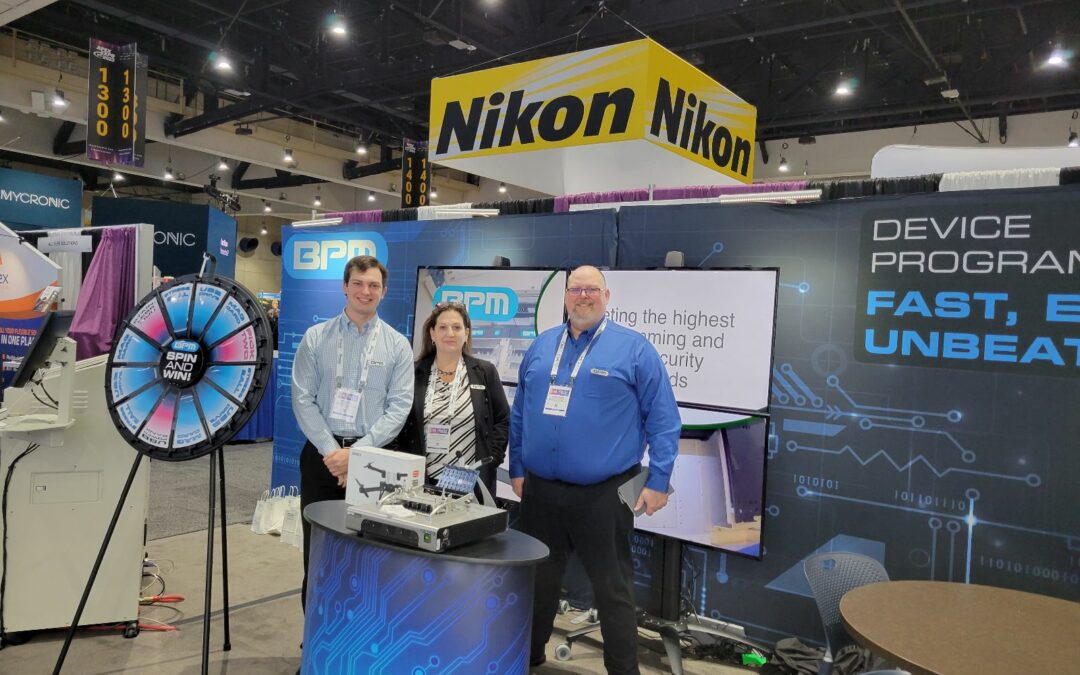
by Scott Bronstad | Jan 25, 2023 | Announcements, Events, News, Trade Shows
San Diego, CA – January 24, 2023 – BPM Microsystems, a leading provider of automated programming systems, is pleased to announce a great first day at the
APEX Expo 2023, taking place in San Diego from January 24th to January 26th.
BPM Microsystems can be found at Booth 1219, where they will be showcasing their latest offering, the BPM310 Automated Programming System. The company has reported a great first day at the expo, with 55 documented visitors to the booth and 6 machine demonstrations of the BPM310 system.
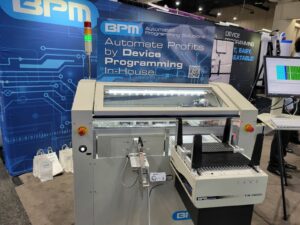 “We are thrilled to be participating in this year’s APEX Expo and to have the opportunity to showcase our innovative technology to such a large and diverse audience,” says Colin Harper, Director of Sales and Product Management for BPM Microsystems. “We would like to extend our congratulations to the team for their hard work in making this event such a success.”
“We are thrilled to be participating in this year’s APEX Expo and to have the opportunity to showcase our innovative technology to such a large and diverse audience,” says Colin Harper, Director of Sales and Product Management for BPM Microsystems. “We would like to extend our congratulations to the team for their hard work in making this event such a success.”
BPM Microsystems invites all attendees to stop by booth 1219 to see the BPM310 Automated Programming System in action and to speak with their team of experts. To schedule a personal demonstration, click here (hurry, limited availability)
For more information on BPM Microsystems and the BPM310 Automated Programming System, click here.
Global SMT Live at APEX Expo 2023
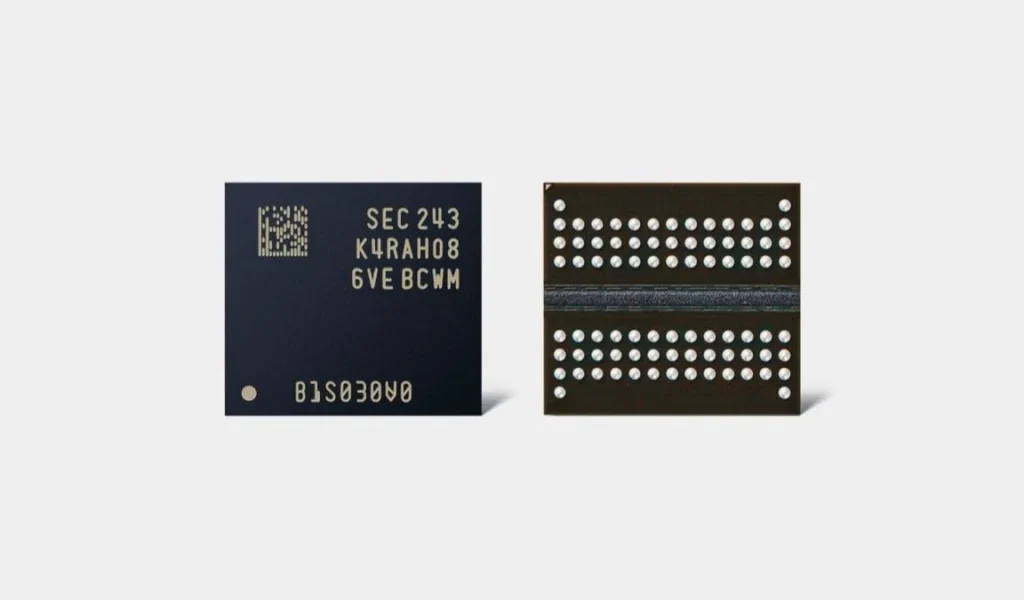
by Scott Bronstad | Dec 21, 2022 | Announcements, News
According to Global SMT, Samsung announced the world’s first DDR5 DRAM chips manufactured using 12nm semiconductor manufacturing technology. The company unveiled its 16Gb DDR5 DRAM chips and said they have already been evaluated for compatibility with AMD’s Zen processors.
The new chips are more efficient and offer 23% better performance than previous-generation DRAM chips. The South Korean company said it made this technological leap possible by using high-κ material, which increases cell capacitance. Samsung also used its own technology to improve critical circuits.
The company’s new DDR5 DRAM chips use advanced multi-layer lithography to achieve the industry’s highest die density and offer 20% higher wafer productivity. These chips are capable of transfer rates of up to 7.2 Gbps, which is equivalent to processing two 30GB 4K movies in one second.
Samsung will begin mass production of its 12nm class DDR5 DRAM chips in early 2023. Products based on these DRAM chips can be expected sometime in the last quarter of 2023.
DDR5
DDR5 (Double Data Rate 5) is a type of computer memory that is used in computers, servers, and other devices that require high-speed data transfer. It is the successor to DDR4 and offers improved performance and higher density compared to its predecessor.
The size of the technology used to manufacture a memory chip, such as DDR5, is typically measured in nanometers (nm). A smaller technology size generally allows for higher density and better performance, as it allows more transistors to be packed into a smaller area.
As of 2021, DDR5 memory chips are generally manufactured using technology sizes of 10nm or 12nm. Using a 12nm technology size allows for a higher density of transistors on the chip, which can lead to improved performance and power efficiency.
It is worth noting that technology sizes are constantly improving, and memory manufacturers are continually working on new technologies and processes to further improve the performance and density of their products.
Read Global SMT Article
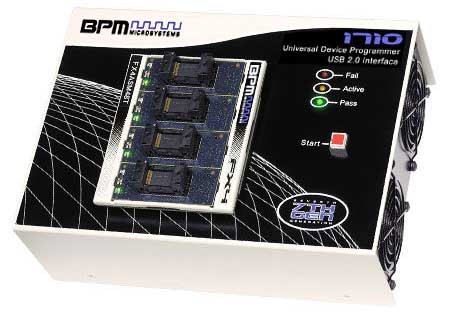
by Scott Bronstad | Dec 14, 2022 | Announcements
BPM Microsystems plans to accept orders for 7th Generation series programmers, subject to availability.
Introduced by BPM Microsystems in 2005, the 7th Generation series programmers have offered an exceptional return on investment and productivity for over 17 years. We recognize that many customers continue to use the 7th Generation, programming millions of devices annually. Supply chain constraints, key component availability, and increasing cost of support are driving this decision.
We encourage customers to contact Sales to discuss upgrades and trade-in options. BPM’s 10th Generation programmers can be more than 10x faster and offer 500x more memory than the 7th Generation programmers.
Products Affected
1710 & 2710 Series – This includes but is not limited to 1710, 2710-2, 2710-4, 2710-6, FX710-240-2-STE, FX710-240SITE, FX710-AM-240STE and all parts, sub-assemblies or components of said programmers. This policy can be changed or canceled at any time without notice.
- Warranty repairs will be honored through the standard 1-year hardware warranty.
- Non-warranty repairs will be provided on a best-effort basis.
- Parts, sub-assemblies, and components will no longer be sold separately and will be used exclusively at the BPM Microsystems’ factory repair center.
- Algorithms and Software Updates – Customers with valid support contracts can continue requesting algorithms and accessing BPWin software updates.
- Software Support Contracts – Customers can continue to purchase BPWin software support contracts.
- Hardware Support Contracts – Effective immediately, extended warranty renewals will be offered on a case-by-case basis. BPM will continue to honor those existing hardware support contracts in place at the time of this notice.
- Socket Modules, Daughter Cards, Socket Cards, and Replacement Sockets – Customers can continue to purchase “adapter” products with the exception of obsolete or discontinued items.
Despite discontinuing selling 7th Generation Manual Programmers, BPM Microsystems will continue to service existing 7th Generation programmers for as long as our stock of critical parts allows.
BPM will continue to offer software updates, algorithms, and socket module development. Existing socket modules and replacement daughter cards will still be available for purchase.
To help you manage this transition, we are offering a Last Time Buy (LTB) opportunity. This allows you to purchase the 1710 Manual Programmer in the quantity you may need for the foreseeable future.
BPM Device Programmers | 1710 Manual Programmer
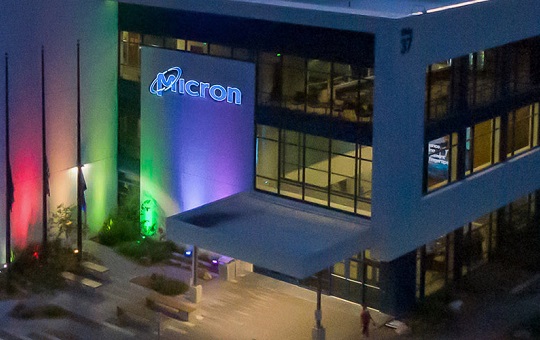
by Scott Bronstad | Oct 5, 2022 | Announcements, Technology
 Micron, the largest manufacturer of memory chips in the United States (current stock price here), plans to invest up to $100 billion dollars over the next 20 years to build a chip factory in central New York, the company announced. A $20 billion investment is planned for the first phase through 2030 and is expected to create nearly 50,000 jobs.
Micron, the largest manufacturer of memory chips in the United States (current stock price here), plans to invest up to $100 billion dollars over the next 20 years to build a chip factory in central New York, the company announced. A $20 billion investment is planned for the first phase through 2030 and is expected to create nearly 50,000 jobs.
The announcement follows the company’s $40 billion project in Boise, Idaho, which coincided with the passage of the US CHIPS Act earlier this year. The New York site could contain four 600K-square-foot clean rooms, equivalent to forty football fields.
Micron aims to increase DRAM production in the United States to 40% of its global output over the next decade (currently, most production is in Asia). New York production will begin in the second half of the decade as demand recovers. Manufacturing in the U.S. helps customers build products into a more secure supply chain, the company said.
Read the full Global SMT article here. | Read Micron’s press release here.
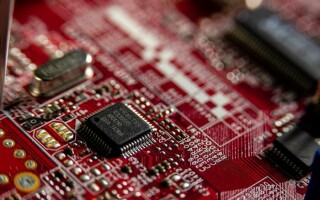
by Scott Bronstad | Oct 4, 2022 | Announcements, Automotive, News, Technology
By Stelios Diamantidis, Senior Director, Synopsys Autonomous Design Solutions
There hasn’t been another time in recent memory where semiconductors have become critical to fueling the electronics industry’s economic framework. The global chip shortage has become abundantly clear, which continues to distress industry sectors from automotive to consumer electronics.
In addition to holding back global economic growth and making life difficult for consumers and businesses worldwide, the shortfall in manufacturing capacity is uneven, affecting legacy process nodes far more than mid-performance nodes.
While semiconductor experts have been hard at work on scoping solutions, the situation has looked insoluble- simply put, semiconductors are extremely hard to design and manufacture; supply chain effects are very difficult to absorb due to this lack of flexibility.
Enter silicon remastering, a new AI-driven design framework with the potential to transform the global chip supply chain. To understand how we must acknowledge the root of the problem: an imbalance in manufacturing capacity. Process nodes built on legacy silicon technologies are in extremely short supply. With them running out, using past technologies to replenish them is no longer a viable option.
Read the full Embedded Computing Design article here
Automotive Device Shortage Update | Bring Device Programming In-House (Video) |
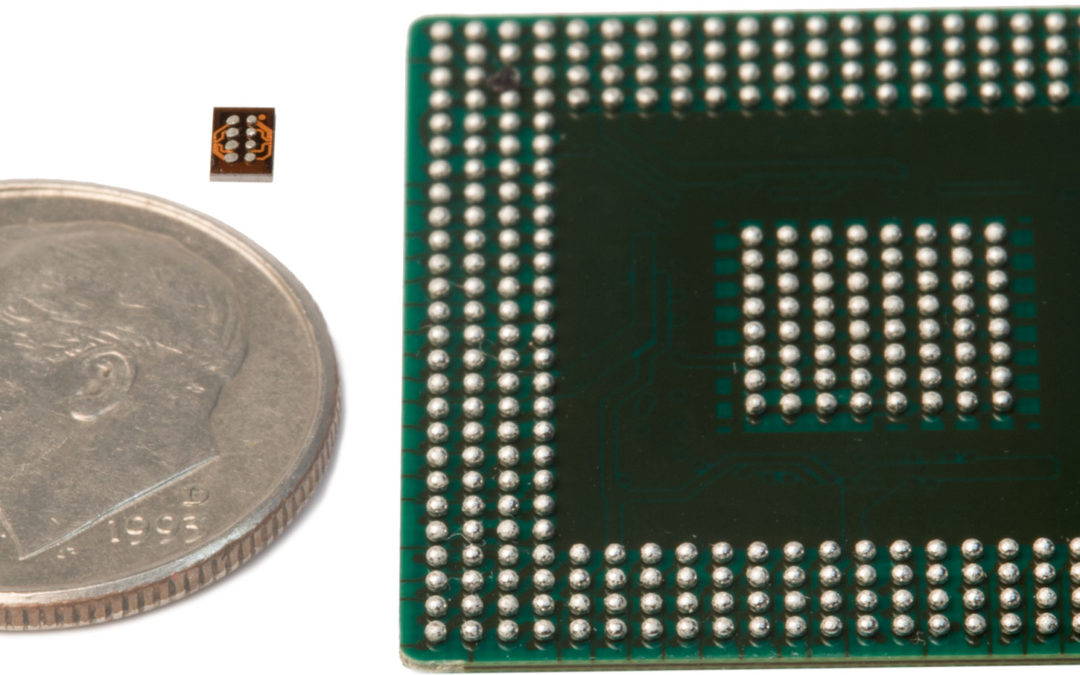
by Scott Bronstad | Sep 19, 2022 | Announcements, News
BPM is pleased to update the estimated support lead times for a variety of devices
BPM has nearly doubled the engineering staff in Device Support in the past year. We have more resources than we’ve ever had and adding even more team members. This is helping to reduce lead times for new device support requests (DSRs). We’ve also segmented support by device type and complexity. The following chart breaks it down:
| Algo Device Support Request by Device Type |
Algo Lead Time |
| Simple Update: |
5 Days |
| Package Addition: |
2 Weeks |
| NOR Flash, Serial NOR Flash, EEPROM, Serial EEPROM, Parallel EEPROM, Raw NAND, eMMC, HS200 or HS400 eMMC, Simple PLD: |
4 Weeks |
| Simple Microcontroller, Standard Microcontroller: |
4 to 8 Weeks (depends on complexity) |
| Complex PLD, Actel Flash, Actel Antifuse: |
8 Weeks |
| Raw NAND with BBM, Complex Microcontroller, FPGA, BBM Scheme, Complex Xilinx Antifuse: |
Requires Research to Quote |
BPM currently supports over 70,000 devices from over 200 manufacturers. For the supported device search, click here.
Current BPM customers get free Algorithm Support Credits (up to six $500 credits) for new support with a current Software Agreement. Manual production programmers get four algorithm credits; Automated Programmers get six algorithm credits, good for one year. You can learn more here. To request new device support with faster device support lead times, click here.
Support Agreement
 BPM’s production level support agreement is designed for those customers who run critical operations and demand the highest level of support possible, and includes the following:
BPM’s production level support agreement is designed for those customers who run critical operations and demand the highest level of support possible, and includes the following:
- 24/7 Hotline: +1 832-617-5702
You can report issues with device production outside of normal business hours. The customer will be put into contact with a live Field Service Engineer (for APS-related issues) or Customer Service Engineer (for device-related issues). Engineers will work with customers to collect all data on the issue, provide debug steps to resolve the issue over the phone, and will immediately create a BPM case if the issue requires additional time to resolve. This service is available to any BPM customer located in North America (Canada, the US, and Mexico). Fees apply if not covered by the current service/software contract.
- Spare Parts
Warranty replacement parts can ship from our headquarters in Houston, Texas, or directly from one of our global stock locations. Warranty replacement does not cover consumable parts or damage caused by the customer. In the case of local spare parts, customers have had replacement parts at their facility installed in less than 30 minutes.
- Priority Case Handling
You will receive priority in our new customer relationship management system. All of your incoming cases will receive a special tag that designates you as a full support user and we will prioritize your requests as necessary.
- On-Site Support
On-site support does not require a PO for labor hours when you are under a hardware contract.
Learn More
If you would like to learn more about BPM or have a service or technical-related question, please call +1 (713) 688-4600, toll-free in the US at (855) SELL BPM, or 24/7 Service hotline at +1 (832) 617-5702. You can also email technical support at tech@bpmmicro.com.
How to Program In-House | Device Programmers from BPM

 “We are thrilled to be participating in this year’s APEX Expo and to have the opportunity to showcase our innovative technology to such a large and diverse audience,” says Colin Harper, Director of Sales and Product Management for BPM Microsystems. “We would like to extend our congratulations to the team for their hard work in making this event such a success.”
“We are thrilled to be participating in this year’s APEX Expo and to have the opportunity to showcase our innovative technology to such a large and diverse audience,” says Colin Harper, Director of Sales and Product Management for BPM Microsystems. “We would like to extend our congratulations to the team for their hard work in making this event such a success.”



